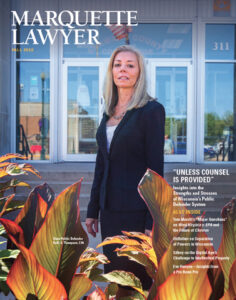Warnings about forces shaping the future of the US Supreme Court were the common denominator in two virtual “On the Issues with Mike Gousha” programs in recent days. But the warnings pointed in much different directions.
In one conversation with Gousha, the Law School’s distinguished fellow in law and public policy, Russ Feingold, a former Democratic senator from Wisconsin who recently became president of the American Constitution Society, said that if Democrats regain control of the White House and Senate, action may be taken to respond to what he called the stealing of two US Supreme Court seats by Republicans.
Feingold said that Republicans who rapidly approved the nomination of Justice Amy Coney Barrett are “setting off a situation where progressives and Democrats and others may have no choice but to consider the basic nature of judicial tenure or the number of members on the Supreme Court.”
“When you have been stolen form — and I will maintain that view — there needs to be compensation, there needs to be reparation, “Feingold said. “Something has to be done to undo this, or the United State Supreme Court is going to be in a freefall in terms of its credibility.”
The second seat Feingold referred to as stolen was the one denied Judge Merrick Garland in 2016 after he was nominated to the Court by President Barack Obama and Republicans refused to consider him.
The American Constitution Society is a liberal organization that is intended to counter the conservative Federalist Society, which has been deeply involved in appointments of justices and federal judges. While the American Constitution Society is not allowed to lobby on political matters, Feingold was clear on his own views and those of allies of the society.
In the other conversation, David French and Sarah Isgur, both involved with The Dispatch, a conservative multi-media organization, said that steps such as the ones Feingold described would not succeed. French is a senior editor at The Dispatch, a columnist for Time, and an author. Isgur is a staff writer for The Dispatch and a commentator on CNN. She worked formerly for the Republican National Committee and was a spokesperson for US Attorney General Jeff Sessions.
 It is nearly 60 years since the Supreme Court of the United States unanimously held, in Gideon v. Wainwright (1963), that individuals facing criminal charges are constitutionally entitled to representation by lawyers. And it has been just over 20 years since the death of Marquette Law School Dean Howard B. Eisenberg, who, early in his career, was a central figure in Wisconsin’s effort to comply with Gideon—in designing the state’s system for providing publicly funded representation for defendants unable to afford an attorney.
It is nearly 60 years since the Supreme Court of the United States unanimously held, in Gideon v. Wainwright (1963), that individuals facing criminal charges are constitutionally entitled to representation by lawyers. And it has been just over 20 years since the death of Marquette Law School Dean Howard B. Eisenberg, who, early in his career, was a central figure in Wisconsin’s effort to comply with Gideon—in designing the state’s system for providing publicly funded representation for defendants unable to afford an attorney.